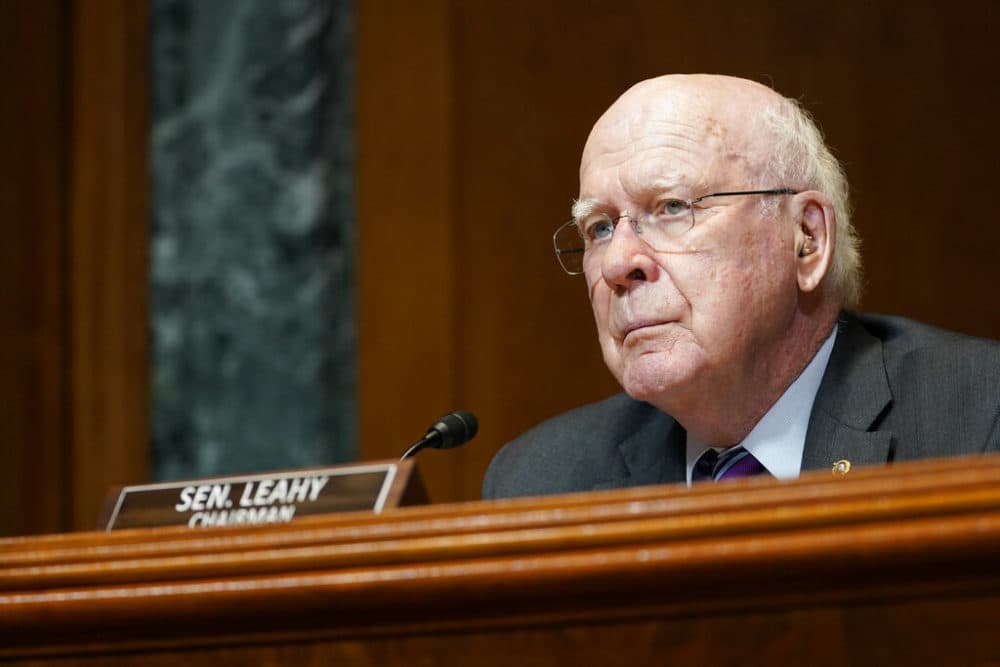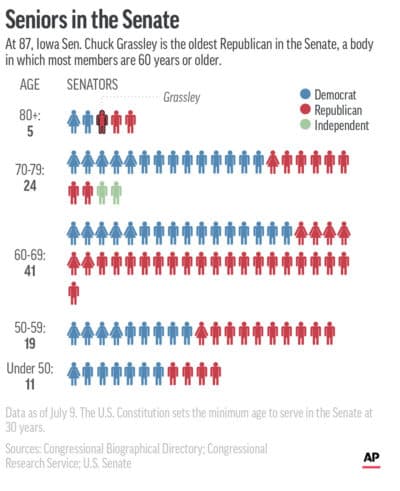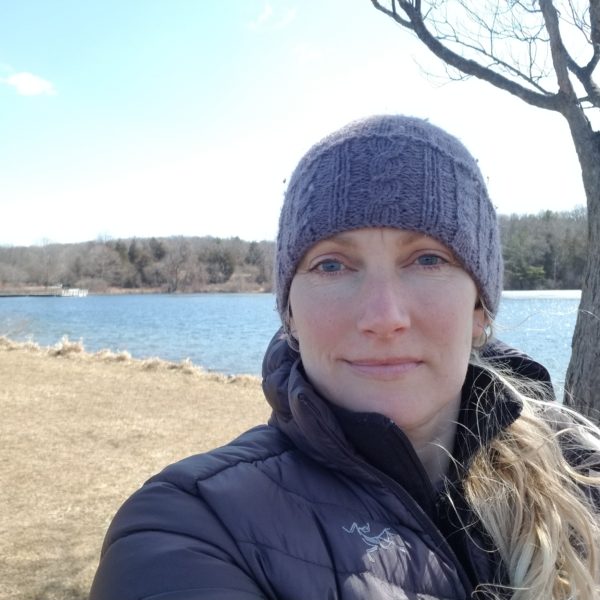Advertisement
Are U.S. elected officials getting too old?
Resume
Last year, then 87-year-old Sen. Dianne Feinstein, asked the same question to Twitter’s Jack Dorsey twice.
"Now, here’s the question … does that label do enough to prevent the Tweet’s harms when the tweet is still visible and is not accurate?" the senator questioned.
In 2018, 80-year-old Mississippi Sen. Thad Cochran's failing health forced his retirement.
"Because I don’t speak often on the floor of the senate, I usually prepare some notes. My staff suggests some things I might want to discuss," the senator said.
Cochran died a year later. On the other hand, 88-year-old Sen. Chuck Grassley says he's running for reelection.
Today, On Point: Age confers wisdom. But does it also disconnect some politicians who've been in office longer than 100 million Americans have been alive?

Guests
Maxwell Alejandro Frost, 24-years-old. He is running for Florida’s 10th Congressional District. (@MaxwellFrostFL)
Melody Crowder-Meyer, assistant professor of political science at Davidson College. (@MCrowderMeyer)
Louise Aronson, geriatrician, writer and professor of medicine at the University of California, San Francisco. Author of "Elderhood: Redefining Aging, Transforming Medicine, Reimagining Life." (@LouiseAronson)
Also Featured
Timothy Noah, staff writer at The New Republic. Author of the 2019 Politico piece “America, the Gerontocracy."
Transcript: 24-year-old congressional candidate Maxwell Alejandro Frost's reflections on the age of U.S. elected officials, why America needs more young representatives
MEGHNA CHAKRABARTI: Are members of Congress too old?
MAXWELL ALEJANDRO FROST: Well, look, this is what I'll say. I believe that generally, yes, I believe our Congress is skewing way too old. And from what you said before as well, I don't believe that we should be kicking members out right now because they're too old. We don't want an ageist society. But we definitely need a body of government that actually reflects the people, one that actually reflects the entire people all across the country. And I believe we need younger folks in government. We need people from different backgrounds, teachers, nurses, and we need a diversity in government, not just the same old, same old we've been getting.
CHAKRABARTI: And you have a particularly strong view on this because folks, Maxwell Alejandro Frost is running for Congress in Florida's 10th Congressional District. He's 24-years-old and the minimum age for the House is 25. But if Maxwell gets elected, he would be 26 when sworn in, so just over the wire. I should also note that he's running as a Democrat. And among both Democrats and Republicans, I see at least seven or eight others in the race as well. So first of all, Maxwell, tell me a little bit more, if you could, about why in your case, in particular, why you think at age 24, almost 25, that you would do the job better than an older, a potential member of Congress.
Advertisement
FROST: Me personally, I've been organizing since I was 15-years-old. What got me into this work was the Sandy Hook shooting. It's really what [thrust] me into advocacy and organizing. Since then, I've worked on many different campaigns full-time, straight out of high school. I've had the honor of working for the national ACLU and also was recently the national organizing director for March for Our Lives. ... An organization that had one of the largest marches in the history of our country. So I don't really think it's a question of experience per se, but a question of life experience and what we're going through as a generation. I'm a member of Gen Z. A lot of folks, we have different names. The climate crisis generation, or the school shooting generation. And these things are sad but true, right? You know, we're coming up, today's the anniversary of Columbine, and really nothing has been done to stop gun violence.
FROST: Yet my generation, the only solution we've been given is to know what to do in school if a shooting happens. So very reactive policy, very reactive things and not figuring out how we can solve these problems. And this is part of the reason why I believe we need younger folks in government, because of our experience, which is kind of funny. But because of our experience, because the issues we're going through now are just vastly different than what older folks in Congress went through when they were kids. And that's not to take away from them, but just to say, we need this added perspective in the halls of Congress so we can have the fierce urgency we need to deal with these issues.
CHAKRABARTI: So Sandy Hook in Connecticut, can you tell me a little bit more about what it was about that particularly awful school shooting?
FROST: Definitely. I mean, look, I grew up in a community that did not have everyday gun violence. I remember specifically what was going on. I was at a jazz band concert. It was before jazz band concert. Actually, I'm a jazz drummer. And we were eating at a restaurant, and we just looked up at the TVs and we saw what was going on and we were completely shocked. It was my group of friends and I. And we saw little kids being walked out of their elementary school surrounded by SWAT. We saw that someone walked in there and murdered a ton of people for absolutely no reason. And it messed with me. I couldn't even play right that night at the concert. I just kept thinking about it. I begged my parents to let me go to Washington, D.C. for the memorial that was going on in the National Cathedral, for the kids. And I got to lobby with the parents of the victims for safer gun laws.
FROST: But it was the night of the vigil, something very specific happened. We were sitting around a pool, kind of wading our feet in the water. It was all the kids and teenagers. And across from me was a guy named Matthew Soto. His sister, Vicki was murdered during that shooting. She's actually a teacher who had hid kids in cabinets. And when the shooter came around and said, Where are the kids? ... She refused to tell him. And seeing Matthew crying, talking about how much he missed his sister. Seeing a 16-year-old with the demeanor of a 60-year-old completely changed my outlook. It changed my life. I went back to the hotel room that night. I was crying. I even called my mom and I said, I want to work for the rest of my life to ensure that no one has to ever feel the way I saw Matthew feel today.
CHAKRABARTI: And we're just days away from the ninth anniversary of the Sandy Hook massacre. And so, I mean, you must have been almost the same age as Soto's brother at the time. I mean, you were like, what, 14, 15?
FROST: Yeah, 15-years-old. Exactly.
CHAKRABARTI: OK. So I mean, point taken that this is the America that you've grown up in, which may not have been the America that a current 50 or 60 year old member of Congress grew up in. But there isn't really anything preventing someone by virtue of their age from having that kind of awareness and empathy and sense of duty on issues like gun violence in America. So what's really the difference?
FROST: I think there's two answers to the question, I think the first one is there is a difference between empathy and putting yourself in someone's shoes and reading statistics and reading things. And being someone who's been through it, I look at somebody like Lucy McBath, Representative Lucy McBath, who lost her son tragically to gun violence here in Jacksonville, Florida. And she took that tragedy, she turned it into a call to action, and she answered it. She ran for Congress, and she's a fierce advocate for ending gun violence because she's been affected by it personally. She didn't read about it. She buried her son.
FROST: And you know, the fact of the matter is that we need more folks who have been affected by this issue — and by every issue — to be in Congress. Folks who go in with the fierce urgency. It's the same for climate change, the same for many different issues. And with young folks, we're experiencing issues to a degree that our parents and our parents parents just didn't didn't go through at that same level. Things like climate change. I mean, the climate crisis is happening now. We all read that U.N. report that says we have to begin to prepare for the worst. I mean, that's our adulthood.
CHAKRABARTI: I just have one more quick question before we run out of time with you, Maxwell, if I could. Now, I'm not going to incite sort of intergenerational tension here by any means. But when one is running to represent a district in Congress, you're running to represent everyone. And at the same time, and we're like, what, 15-ish years away from when the Census Bureau says there will be more Americans over the age of 65 than there will be young children. So do you think you'll be able to well represent the older members of your district? I mean, like what's the the mirror image argument to what you're saying about why younger people should be in Congress?
FROST: Yeah, no. I completely understand, and we will be able to represent them to the highest level. I mean, look, I've been doing this work, like I said since I was 15, working with older folks. I worked on Amendment 4 here, traveling the country with people who were previously incarcerated. And it's getting in the community, having these conversations that'll give us the awareness we need to represent every single person. And young people are more than capable and ready to do that work.
This program aired on December 6, 2021.

